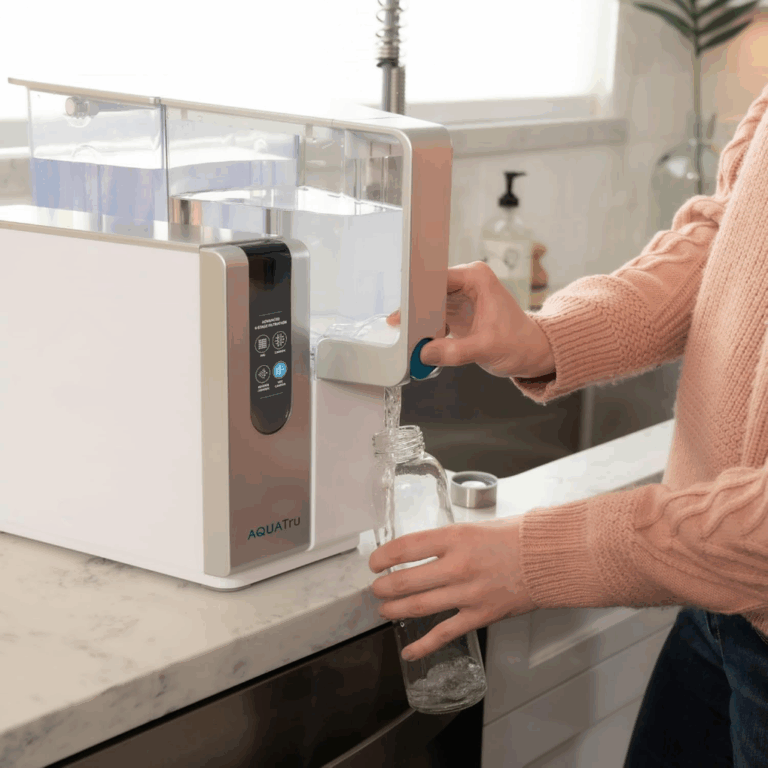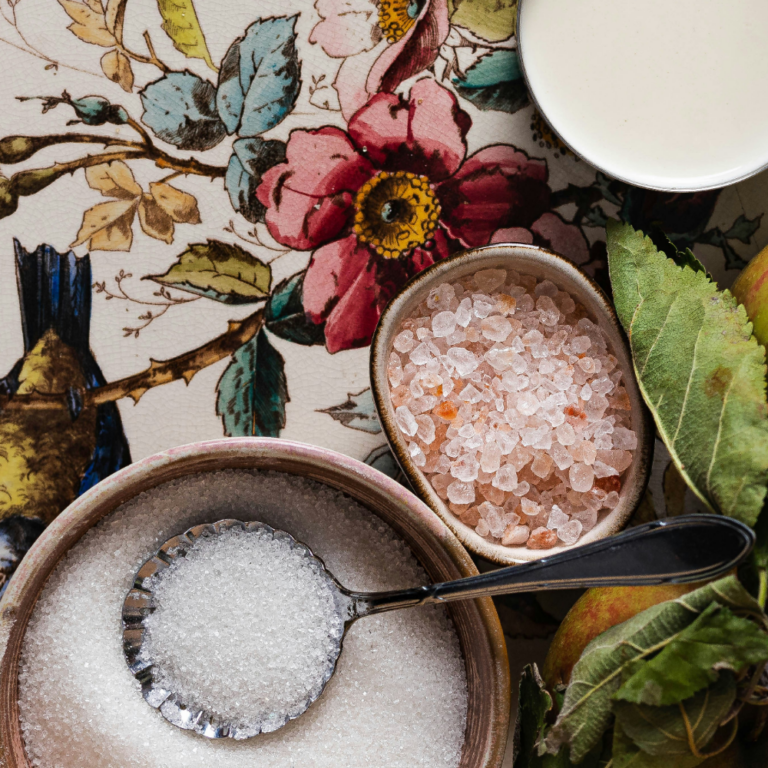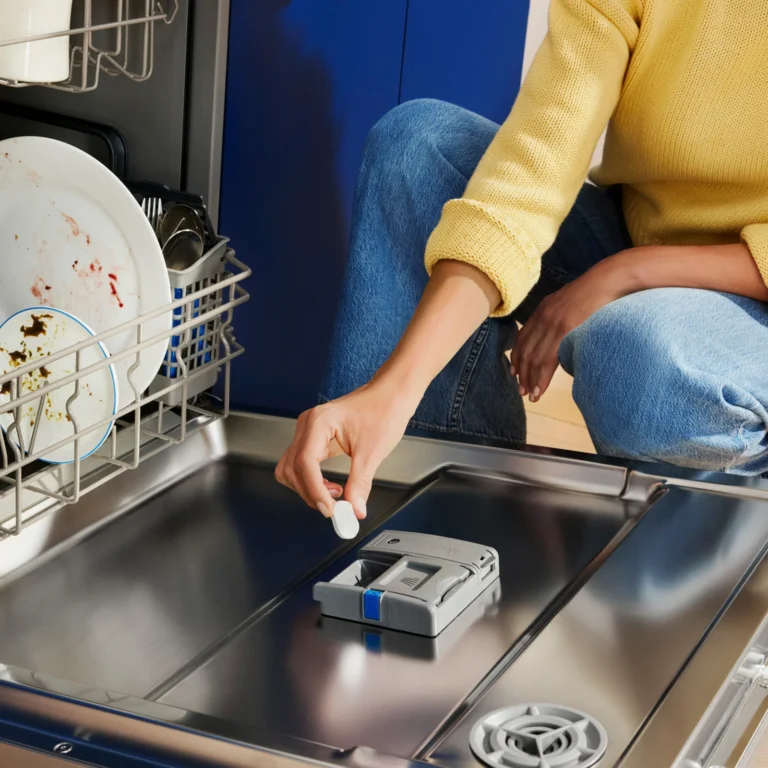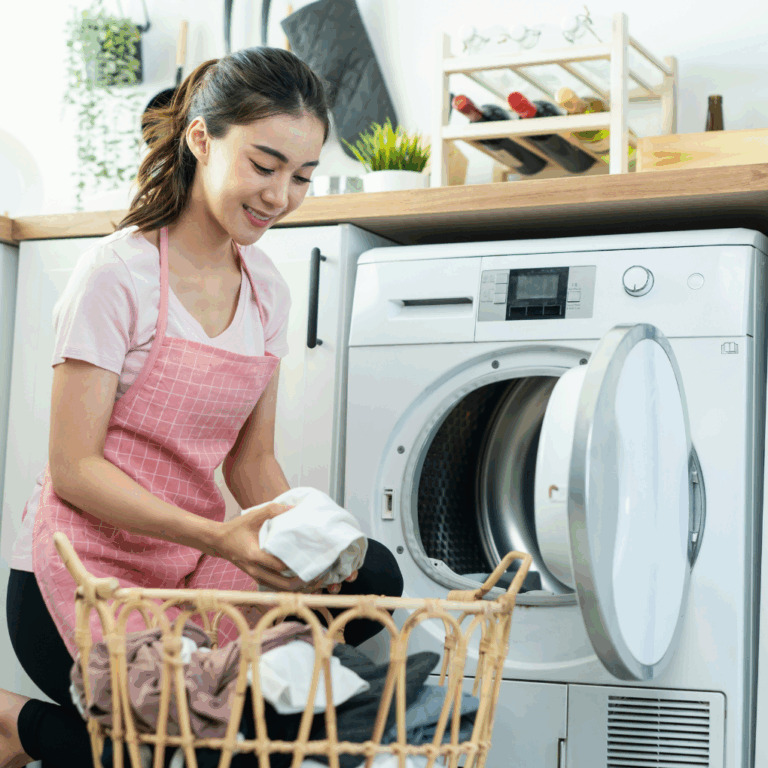Did you know the average household creates nearly five pounds of waste every day? That’s 147 pounds a month, about the size of a large washing machine! It sounds like a lot (because it is), but you don’t need to overhaul your entire life to make a difference.
Small eco-friendly swaps can cut waste, save money, and simplify your life without overwhelming you. Over the years, I’ve switched to reusable products, adopted sustainable habits, and created a more intentional home.
This guide will show you practical, low-effort swaps that reduce waste, lower costs, and help you live more sustainably — one small change at a time.
Essential Kitchen Eco Swaps
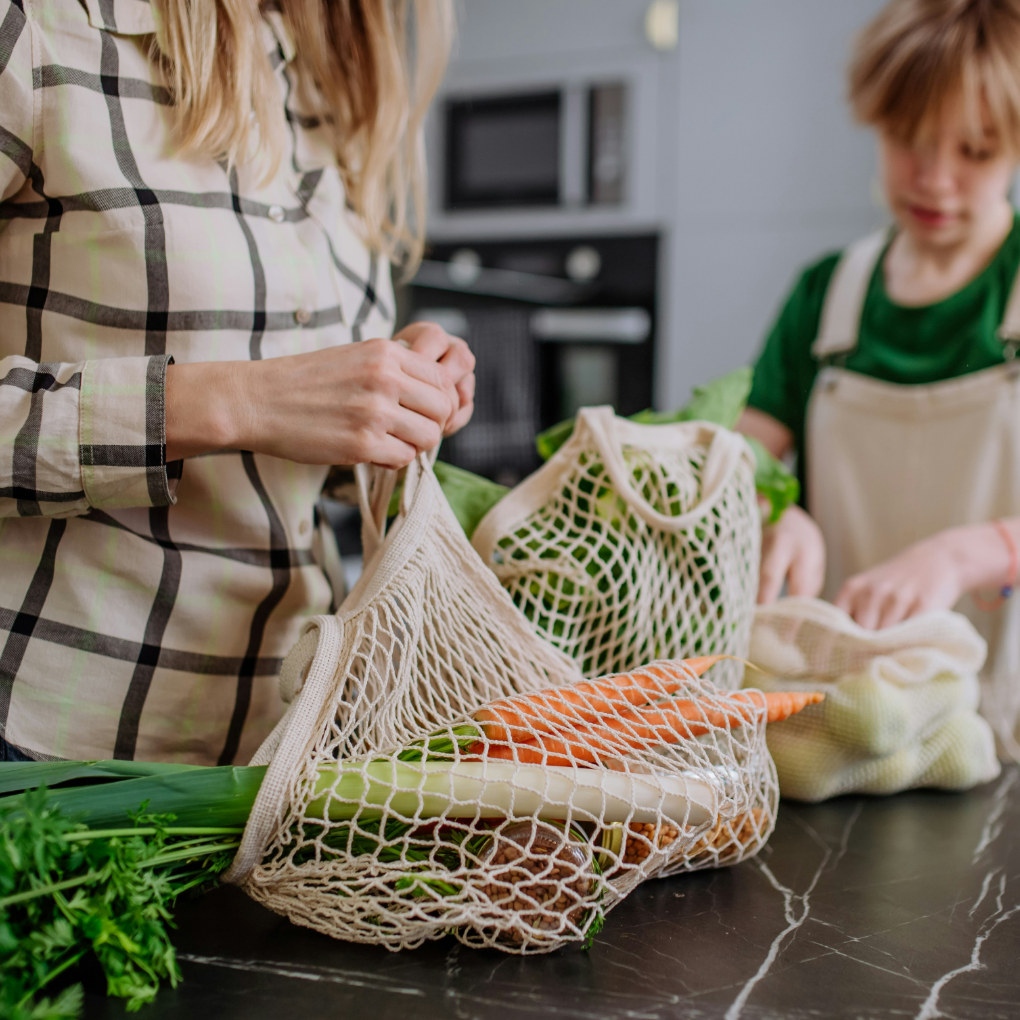
Your kitchen is the heart of your home, and often a hotspot for waste. With a few smart eco swaps, you can make it more sustainable without sacrificing convenience. With a few simple swaps, you can ditch disposables, embrace reusable options, and set the stage for a zero-waste kitchen that’s both practical and stylish.
1. Reusable Alternatives to Common Disposables
Say goodbye to single-use plastic bags and hello to sturdy, reusable alternatives. Canvas grocery bags, silicone produce bags, and washable snack pouches are easy swaps.
Instead of cling wrap, try beeswax wraps or silicone stretch lids. They’re perfect for keeping leftovers fresh without the waste. Don’t forget glass or stainless steel containers for meal prepping and food storage. They’re durable, non-toxic, and way classier than stained plastic tubs.
2. Plastic-Free Food Storage Solutions
Ever thought about storing your pantry staples in style? Glass jars, metal tins, and ceramic containers make organizing your grains, pasta, and baking supplies eco-friendly and visually satisfying. Plus, they keep food fresher for longer and eliminate the risk of plastic-related toxins.
For freezing, skip the plastic and opt for silicone bags or glass freezer-safe containers. They’re leak-proof and reusable, so no more tossing freezer bags after a single use!
3. Sustainable Cleaning Supplies and Tools
Cleaning up can clean up the planet, too. Swap out paper towels for washable cloths or old T-shirts cut into rags. For sponges, consider compostable options made from loofah or natural fibers. And instead of chemical-laden cleaners, consider DIYing your own with vinegar, baking soda, and essential oils, or opt for eco-friendly brands that prioritize sustainable packaging.
Wooden dish brushes with replaceable heads and stainless steel scrubbers are durable and kind to the environment. They’ll last much longer than those bright green-and-yellow sponges.
4. Composting for a Zero Waste Kitchen
One of the simplest ways to reduce kitchen waste is to start composting. Scraps like fruit peels, coffee grounds, and veggie ends can all be given a second life as nutrient-rich compost for your garden or even your houseplants!
Short on space? An under-sink compost bin that attaches to the inside of a cabinet door is a sustainable storage solution that’s perfect for small kitchens. It’s discreet, easy to access, and keeps things tidy while you work toward your zero waste goals. Many of these bins come with carbon filters to minimize odors, making them a practical addition to any eco-friendly kitchen setup.
🔗 COMPOSTING HELP
Composting for Apartment Dwellers
Peels is a free, non-commercial platform that connects people with food scraps to nearby composting hosts—whether they’re neighbors, community gardens, or local businesses.
It’s designed for easy drop-offs, with a map-based system and built-in messaging to coordinate composting in urban spaces. You can explore it at Peels.app.
5. Zero-Waste Grocery Shopping Essentials
A genuinely sustainable kitchen starts with your shopping habits. Invest in reusable produce bags, bulk bin containers, and jars for things like grains, nuts, and spices. Farmers’ markets and co-ops are great places to shop plastic-free while supporting local growers.
Oh, and don’t forget your trusty reusable grocery bags. Stash a few in your car or by the front door so you’re always prepared. They’re an essential part of building a waste-free kitchen arsenal!
With these swaps, you’ll not only create a zero-waste kitchen but also inspire others to follow your lead. Sustainability starts in small corners like your pantry or under-sink cabinet and grows from there!
Find some of our favorite products in this article! 👇
Bathroom Eco-Friendly Makeover
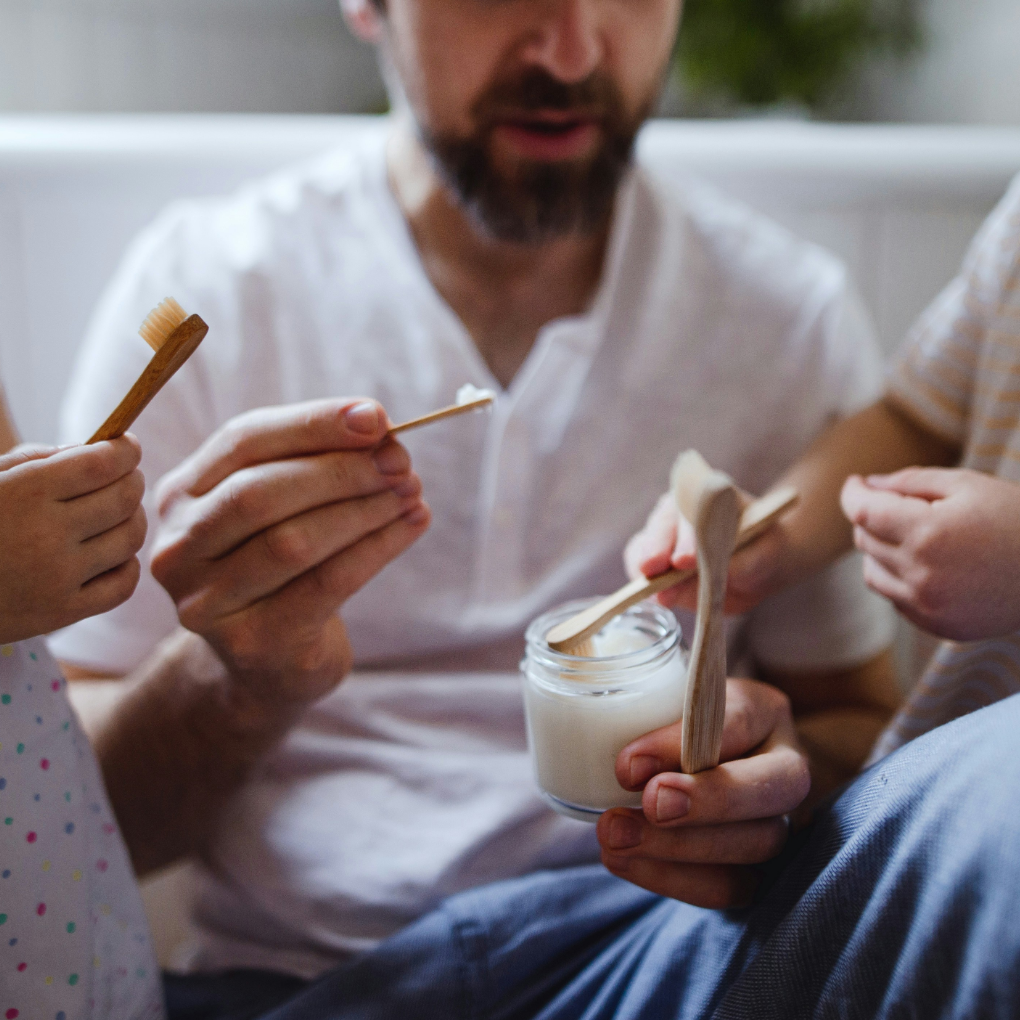
Your bathroom might be small, but it’s a big opportunity for sustainable changes. From reducing plastic waste to conserving water, transforming this space can have a surprisingly positive impact on your eco footprint. Let’s explore some simple swaps to create a more plastic-free bathroom and embrace sustainable personal care.
6. Plastic-Free Personal Care Alternatives
Swap those single-use plastic bottles for refillable or package-free options. Shampoo and conditioner bars are a fantastic alternative, and many come with the bonus of smelling amazing. For body wash, consider switching to good old-fashioned bar soap; make sure it’s packaged in recyclable paper or cardboard.
When it comes to dental care, bamboo toothbrushes, toothpaste tablets, and floss made from natural fibers are excellent swaps for their plastic-heavy counterparts. They work just as well and won’t linger in a landfill for centuries.
💰 tip for saVings
Subscriptions Save More
Grove Collaborative and Blueland offer eco-friendly personal care subscriptions with 15-20% discounts for recurring orders. ThredUp also has a rewards program for sustainable shopping.
7. Eco Swaps for Beauty and Hygiene
The beauty industry is notorious for excessive packaging, but low-waste options are growing fast. Look for makeup in reusable or recyclable containers, and consider refillable palettes for eyeshadow and blush. Many brands now offer biodegradable makeup wipes or washable cloth rounds to replace disposables.
For hygiene, try a reusable razor with replaceable blades, which lasts longer and generates far less waste than disposable razors. Menstrual cups, reusable pads, and period underwear are also fantastic swaps for traditional single-use products.
8. Water-Saving Fixtures and Devices
Minor changes to your bathroom fixtures can lead to significant water savings. Install low-flow showerheads and faucet aerators to reduce water use without sacrificing pressure. For an even bigger impact, consider a dual-flush toilet, which uses less water for liquid waste.
💰 save money tip
Local Utility Rebates
Check Database of State Incentives for Renewables & Efficiency (DSIRE) for local utility rebates on water-saving fixtures. Many utilities offer $50-200 rebates for qualifying installations!
And while we’re at it, turn off the tap while brushing your teeth. It’s a simple habit that can save gallons of water every single day.
9. Sustainable Toilet Paper Options
Traditional toilet paper production is a significant drain on resources, but sustainable alternatives are readily available. Look for brands that use 100% recycled paper or bamboo, which grows quickly and regenerates without the need for replanting. Many options come plastic-free, too; keep an eye out for compostable packaging.
Home and Living Eco Alternatives

Your home is your sanctuary, and making it more eco-friendly doesn’t mean sacrificing comfort or style. Thoughtful eco swaps throughout your space can create a greener, healthier living environment. Here’s how to incorporate green household swaps and natural home products into your everyday life.
10. Energy-Efficient Swaps for Common Household Items
Switching to energy-efficient appliances and fixtures is one of the easiest ways to make your home more sustainable. LED light bulbs, for example, use up to 80% less energy and last much longer than traditional incandescent ones. Smart thermostats can help you optimize heating and cooling, cutting energy use while keeping your home cozy.
💰 save money tip
Energy-efficient Appliances Rebates
EnergyStar.gov helps you find local rebates for energy-efficient appliances. Some utilities offer up to $200 back on smart thermostats and free LED bulb exchanges!
Don’t forget about smaller items, too. Energy-efficient power strips can reduce “phantom power” from devices left plugged in, and rechargeable batteries are a great alternative to disposables.
11. Sustainable Textile and Fabric Choices
From your bedding to your curtains, textiles play a huge role in your home’s environmental footprint. Swap synthetic fabrics for natural, sustainable options like organic cotton, linen, or hemp. These materials are biodegradable, durable, and often feel better, too.
For rugs, throws, and upholstery, look for recycled materials or ethically sourced wool. And when it’s time to replace old items, donate them if they’re still in good shape to keep them out of landfills.
🔗 TEXTILE RESOURCES
Research Sustainable Fashion & Fabrics
Good On You rates fashion brands for sustainability, while Textile Exchange provides free guides on sustainable fabric choices.
12. Eco Swaps for Natural Cleaning
Ditch the chemical-heavy cleaners and opt for natural alternatives that are safe for both your family and the environment. Many eco-friendly brands offer biodegradable products in recyclable or refillable packaging, or you can make your own with simple ingredients like vinegar, baking soda, and essential oils.
For tools, replace synthetic sponges and scrubbers with natural fiber brushes or reusable cloths. A bonus? These alternatives often last longer, saving you money in the long run.
Related Article: Homemade Laundry Powder Detergent: Easy DIY Recipe Guide
13. Waste-Reduction Strategies
Reducing household waste doesn’t have to be complicated. Start by setting up a dedicated recycling station that’s easy for everyone in your household to use. Composting is another fantastic way to keep food scraps out of the trash and turn them into rich soil for your garden or even your potted plants.
For everyday waste reduction, invest in durable, reusable items like stainless steel straws, cloth napkins, and washable food wraps. You’ll save money over time and reduce your reliance on single-use products.
Sustainable Gardening and Outdoor Swaps
Your outdoor space, whether it’s a sprawling backyard or a cozy balcony, is an incredible opportunity to create your biodiversity haven while reducing your environmental impact. The best part? Many of these sustainable swaps will save you money while creating a more beautiful, thriving outdoor space that benefits local wildlife and your community.
14. Creating Your Composting System
Transform your kitchen scraps and yard waste into “black gold” for your garden. Setting up a compost bin or compost pile is one of the most impactful eco swaps you can make. It diverts waste from landfills while creating nutrient-rich soil amendment that your plants will love.
Start small with a simple three-bin system or even just a designated compost pile in a corner of your yard. No space? Glass jars can collect kitchen scraps until you can take them to a local community garden that accepts compostable materials. Coffee grounds, eggshells, fruit peels, and veggie scraps all make excellent additions to your compost mix.
🔗 GARDEN RESOURCES
Find Local Gardening Support & Free Classes
Find your local community garden through the American Community Gardening Association (ACGA)—they offer an interactive map and support for gardeners nationwide.
You can also access free composting workshops through Master Gardener programs in many counties, which often include sessions on worm composting and yard waste. Some municipalities even provide free compost bins to residents through local sustainability initiatives.
15. Smart Water Conservation for Your Garden
Collecting rainwater is like having nature deliver free irrigation straight to your doorstep. Rain barrels are a simple addition that can dramatically reduce your water bill while keeping your plants happy during dry spells. Position them under downspouts and watch as they fill up during storms.
For smaller spaces, even placing a few large containers to catch rainwater can make a difference. Use this collected water for your houseplants, container gardens, or to fill that bird bath that’s about to become a neighborhood hotspot for local wildlife.
16. Plant Choices That Work With Nature
Native plants are the ultimate low-maintenance, eco-friendly choice for any garden. These local heroes require less water, attract beneficial insects and birds, and create a habitat that supports your area’s natural ecosystem. Plus, they’re adapted to your climate, so they’ll thrive with minimal intervention.
Instead of buying new plant pots for every garden project, try plant propagation. Many plants can be grown from cuttings or divisions from existing plants. It’s incredibly satisfying to watch a tiny cutting grow into a whole plant, and sharing propagated plants with neighbors builds community connections.
🔗 PLANT FINDER
Native Plant Discovery Tool
Native Plant Finder by National Wildlife Federation helps you discover plants native to your zip code. Many states offer free native plants through conservation programs—search “[your state] native plant program” for local opportunities!
17. Sustainable Lawn and Garden Care
Ditch the chemical-heavy fertilizers and pesticides in favor of natural alternatives. Compost tea, made from your compost pile, provides gentle nutrition that won’t harm beneficial insects or contaminate groundwater. For pest control, encourage natural predators like birds by adding native plants and water sources like a bird bath.
Consider reducing your lawn area gradually, replacing high-maintenance grass with native groundcovers, food gardens, or pollinator-friendly plantings. Even small changes, such as letting one section grow into a wildflower meadow, can have a significant impact on local biodiversity.
18. Community-Minded Outdoor Swaps
Get involved with your local community garden if you’re short on space or want to learn from experienced gardeners. Community gardens are fantastic places to share resources, trade seeds, and learn sustainable gardening techniques from neighbors.
When cleaning outdoor furniture or garden tools, choose eco-friendly soaps that won’t harm the soil or groundwater. Many natural cleaning solutions work just as well as harsh chemicals and break down safely in the environment.
With these outdoor eco swaps, you’re not just creating a more sustainable lifestyle but contributing to a healthier ecosystem that benefits everyone in your neighborhood. Every native plant you grow and every gallon of rainwater you collect is a small victory for both your wallet and the planet.
On-the-Go Eco Swaps
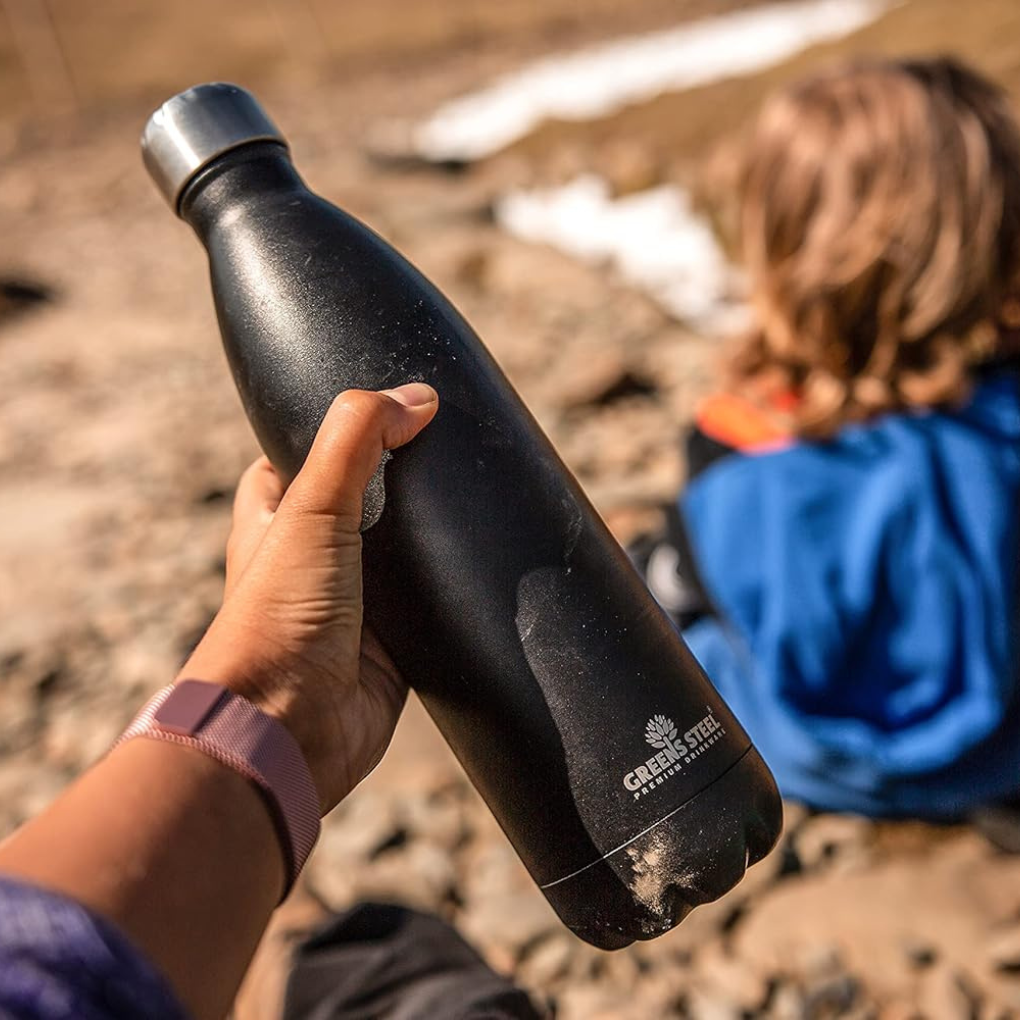
Living a more sustainable lifestyle doesn’t have to stop at your front door. Whether you’re commuting, traveling, or just running errands, there are plenty of ways to keep eco-friendly habits in motion. Let’s explore some simple on-the-go swaps to make your adventures kinder to the planet.
Related Article: Best Plastic Free Water Bottles: Complete Guide (2025)
19. On-the-Go Eco Swaps for Travel
Say goodbye to disposable travel-size products and hello to a reusable kit that’s ready for any adventure. A stainless steel water bottle is a must-have for staying hydrated without single-use plastics, and collapsible coffee cups or tumblers are perfect for your caffeine fix on the move. Don’t forget a set of travel utensils or a spork to skip the plastic cutlery.
For toiletries, consider investing in refillable containers or opting for solid alternatives like shampoo bars and toothpaste tablets. They’re not only better for the environment but also easier to pack.
20. Sustainable Commuting Gear
Your daily commute can be a great place to embrace eco-friendly habits. If you’re biking to work, consider investing in a durable helmet, a bike basket or panniers, and reusable rain gear. Public transit riders can keep a reusable transit card holder or a small bag for essentials to minimize waste.
For drivers, carpooling, keeping reusable grocery bags in the trunk, or even choosing an electric or hybrid vehicle are great ways to reduce your carbon footprint.
21. Zero-Waste Lunch and Snack Solutions
Packing your meals and snacks is a win for your wallet, your health, and the planet. Swap disposable lunch bags for insulated reusable ones, and use glass or stainless steel containers to keep your food fresh. Beeswax wraps or silicone covers are perfect for snacks and sandwiches.
Don’t forget to bring along a reusable napkin and a lightweight lunch kit with cutlery. With these tools, you’ll never need to reach for a single-use alternative again.
22. Eco-Friendly Shopping Accessories
A quick trip to the store doesn’t have to come with plastic baggage, literally. Keep reusable shopping bags handy, and add smaller produce bags for fruits and veggies. For bulk items, lightweight cloth bags work perfectly and save you from the plastic options.
If you’re a coffee shop regular or enjoy smoothies on the go, a reusable straw is a simple addition to your bag. Bonus points if it comes with a little cleaning brush for easy maintenance!
Cost-Effective Eco Swaps
Living sustainably doesn’t have to break the bank; sometimes, it’s the opposite. Many sustainable alternatives save you money in the long run, and making a few eco-friendly swaps today can help you pocket more tomorrow. Let’s explore how to make greener choices without breaking the bank.
23. Budget-Friendly Sustainable Alternatives
Who says being eco-conscious has to be expensive? There are plenty of affordable alternatives to everyday products that are both kind to the planet and your budget. Start with reusable items like shopping bags, water bottles, and coffee cups. Once you’ve made the initial investment, you’ll save money over time.
Opt for biodegradable products like compostable trash bags, bamboo toothbrushes, and natural sponges. These are often priced similarly to their plastic counterparts, and many are better for your health, too!
24. Long-Term Savings Analysis
While some eco swaps may cost a bit upfront (hello, reusable straws or energy-efficient appliances), the long-term savings are worth it. Take cloth napkins, for example, while they may cost a little more than paper towels, you’ll use them over and over again, saving money on disposable paper products in the long run.
Similarly, swapping to energy-efficient LED bulbs or smart thermostats will lower your electricity bills over time, and investing in high-quality, durable items means fewer replacements in the future.
25. Where to Find Affordable Eco Products
You don’t have to pay premium prices for sustainable goods. Plenty of brands offer affordable, eco-friendly products without compromising on quality. Big-box stores often carry eco-friendly cleaning supplies, personal care items, and reusable products at reasonable prices. Local farmers’ markets and bulk stores are also great places to find zero-waste options at lower costs.
And don’t forget online marketplaces like Etsy or eco-friendly subscription boxes that make it easy to find sustainable products without paying a premium.
🔗 BUDGET ECO SHOPPING
Save Money While Shopping Green
- EarthHero – Carbon-neutral shipping and frequent sales
- Package Free Shop – Zero-waste products with bulk discounts
- The Detox Market – Clean beauty with loyalty rewards
- Join the world’s largest gifting community where neighbors share freely—no money, no waste, just connection. With over 13 million members and 2.6 million monthly gifts exchanged, the Buy Nothing Project helps you reduce consumption, build community, and give everyday items a second life.
- ThredUp is one of the largest online consignment and thrift stores, offering women’s and kids’ clothing from brands like Gap, Gucci, Lululemon, and Anthropologie. You can send in your clothes for resale or shop thousands of preloved items at up to 90% off retail.
26. DIY Sustainable Solutions
One of the best ways to save money and be eco-friendly is by making your products at home. DIY cleaners made from simple ingredients like vinegar, baking soda, and essential oils are effective, affordable, and free from harmful chemicals.
If you’re handy with a sewing kit, you can easily make reusable snack bags, produce bags, or even upcycle old clothes into new items like cleaning rags or tote bags. The possibilities are endless, and the satisfaction of creating something yourself is priceless.
🔗 FREE DIY TUTORIALS
Learn to Make Your Own Eco Products
- Pinterest – Thousands of free zero-waste DIY projects
- YouTube channels like “Good Simple Living” and “Fairyland Cottage” – Step-by-step tutorials
- Big Living Little Footprint – Detailed guides with materials lists
- Ravelry – Free patterns for knitted/crocheted eco items
Check out some of our favorite DIYs 👇
💰 FINAL MONEY-SAVING TIP:
Sustainability Savings Jar
Start a “sustainability savings jar”—every time you choose a reusable option instead of a disposable one, put the money you would have spent into the jar. Use these savings to invest in bigger eco swaps like energy-efficient appliances!
FAQs on Eco Swaps
What are the easiest eco-friendly swaps for beginners?
Don’t overthink it — start small! Swap paper towels for cloth rags, trade cling wrap for beeswax wraps or silicone lids, and carry a reusable water bottle and tote. Easy wins that make a big difference.
Do eco swaps really save money?
Absolutely. Reusables cut down on constant repurchases. Items like cloth towels, refillable cleaners, and LED bulbs may cost a little more upfront, but they typically pay for themselves within a few months.
How can I start eco swaps on a budget?
Use what you already have first! Old jars make perfect storage containers, cut-up t-shirts work as cleaning rags, and you can replace items as they run out. One swap at a time keeps it affordable.
What eco swap makes the biggest impact every day?
The kitchen is the best place to start. Ditch single-use bottles, bags, paper towels, and wrap — those swaps alone cut tons of waste from daily routines.
Final Thoughts on The Best Eco Swaps
Start with just one eco swap and build from there. Whether it’s bringing your bags to the store or choosing biodegradable options over plastic, every small choice adds up. A more sustainable lifestyle doesn’t happen overnight, but with steady, thoughtful changes, it’s absolutely within reach.
✨ Want a ready-made plan to ditch hidden plastics? Grab my free Microplastics Home Detox Checklist and start making simple swaps that actually stick.
References
- U.S. Environmental Protection Agency. (2024). National overview: Facts and figures on materials, wastes and recycling. https://www.epa.gov/facts-and-figures-about-materials-waste-and-recycling/national-overview-facts-and-figures-materials
